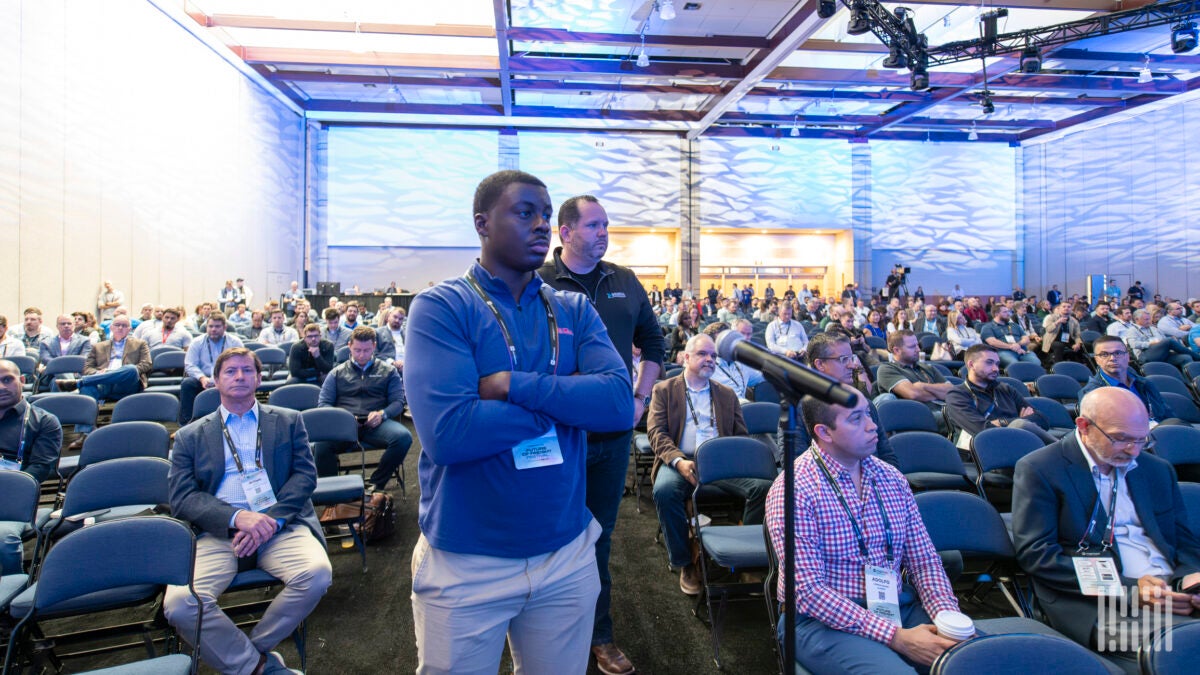CHATTANOOGA, Tenn. — Brad Jacobs took the stage Wednesday at FreightWaves’ F3: Future of Freight Festival, participating in a town hall Q&A event with a live audience.
Jacobs, executive chairman of Greenwich, Connecticut-based XPO Inc. (NYSE: XPO), is a career CEO and serial entrepreneur with a unique track record, having started five companies that all became billion-dollar or multibillion-dollar enterprises.
Along with XPO, Jacobs is the non-executive chairman of its two relatively recent spinoffs: logistics management company GXO (NYSE: GXO) and 3PL RXO (NYSE: RXO).
Jacobs also recently authored a book titled “How to Make a Few Billion Dollars” by Greenleaf Book Group Press. The book, which will be released in January, is for people who want to accomplish “big stuff in life,” he said.
“The book was everything I know about making money; I don’t know anything else,” Jacobs said. “The book could help you not even necessarily make a few billion, but make whatever you want to make, whatever your goal is. It’s also not just about money. … It’s about how do you accomplish big stuff in life? How do you think big? How do you get out of your rut of just thinking the same old, same old and go for it? And then how do you execute on that?”
Jacobs’ wide-ranging town hall at F3 tackled everything from how he started in business to rewiring the mind for positivity to learning from failures to his next big move.
Here are five takeaways:
Jacobs’ next billion-dollar venture will be in the industrial sector
An audience member asked Jacobs, “What’s next? Do you see an opportunity still in transportation? Or do you have another industry or sector on your radar?”
He replied, “I have another industry in mind. I haven’t announced it yet, and I’m not going to do it today. But I will before the end of the year in all likelihood, and it’s not in transportation.”
He revealed only that the next company he starts will be in the “industrial” sector.
“I’m going to do something in another industry that’s industrial, that is large, as in hundreds of billions of dollars in size, where there’s an opportunity to consolidate because that’s my thing, where I can buy, buy, buy, and I can start a company from zero and get it up to tens of billions of dollars in revenue within a few years. That’s what I want to do. That’s what makes me excited. That’s what gets me to wake up in the morning.”

Fear of failure is not necessarily a bad thing
When an audience member said he goes to bed at night fearing that the family-owned company he runs might go out of business, Jacobs said being afraid of failure can be valuable.
“The fear of failure, that’s a good thing. It’s good to have that anxiety. It’s good to not to feel like I’m invincible, I’m definitely going to succeed, because there are going to be setbacks. There’s going to be bad years, there’s going to be people letting you down, there’s going to be problems along the way. That fear, that vigilance for problems coming up, it’s actually your friend. That’s probably one of the reasons you’re successful, is that you’re thinking about what could go wrong, and then dealing with that proactively.”

Middle managers are the backbone of companies
“In the transportation and logistics business, it’s not the C-suite level that determines the success of the company. C-suite level raises all the money and keeps it all together. Take the warehouse business: The warehouse manager is definitely the most important person. If you have a really strong warehouse manager, you’re going to have a profitable, safe, thriving warehouse. If you have a mediocre warehouse manager, you’re going to have fantastic everything else in the organization, but you’re still going to have a very mediocre and maybe not perfectly safe and not a customer-pleasing warehouse. The midlevel management is where it’s at.”

Scaling a company starts with teamwork
When scaling a company, Jacobs said he first focuses on people and then on technology.
“My office is right next to the chief human resources officer’s office, and we walk into each other’s office many times a day talking about our people. Are we paying them right? Is their head in a good place? Are the employee surveys coming out right? Are the engagement scores going up? What problems do we have? How is our [employee] retention? It’s people, people, people, but right after that is technology. Technology makes you better than the competition, and that’s why I’ve always spent huge amounts of money on technology.”

He remains ‘bullish’ on freight brokerages
“We happen to be in the part of the brokerage cycle where it’s very hard to make money. That’s OK. That’s part of the cycle. That’s why it’s a good business. It’s not a flat business. The fact that it is volatile over the course of the years, that’s why brokers exist. Brokers exist to fulfill the needs of shippers and of carriers, because there’s uncertainty. If it was really clear how to find a truck or how to find a load, no one would need brokers. So it’s good that there is volatility there. I think long term, the prospects of brokerages are really strong. I am actually bullish on the long term of the brokerages. Short term, it’s tough.”
Click for more FreightWaves articles by Noi Mahoney.
More articles by Noi Mahoney
Convoy’s collapse, legacy tied to ushering tech into volatile freight markets







